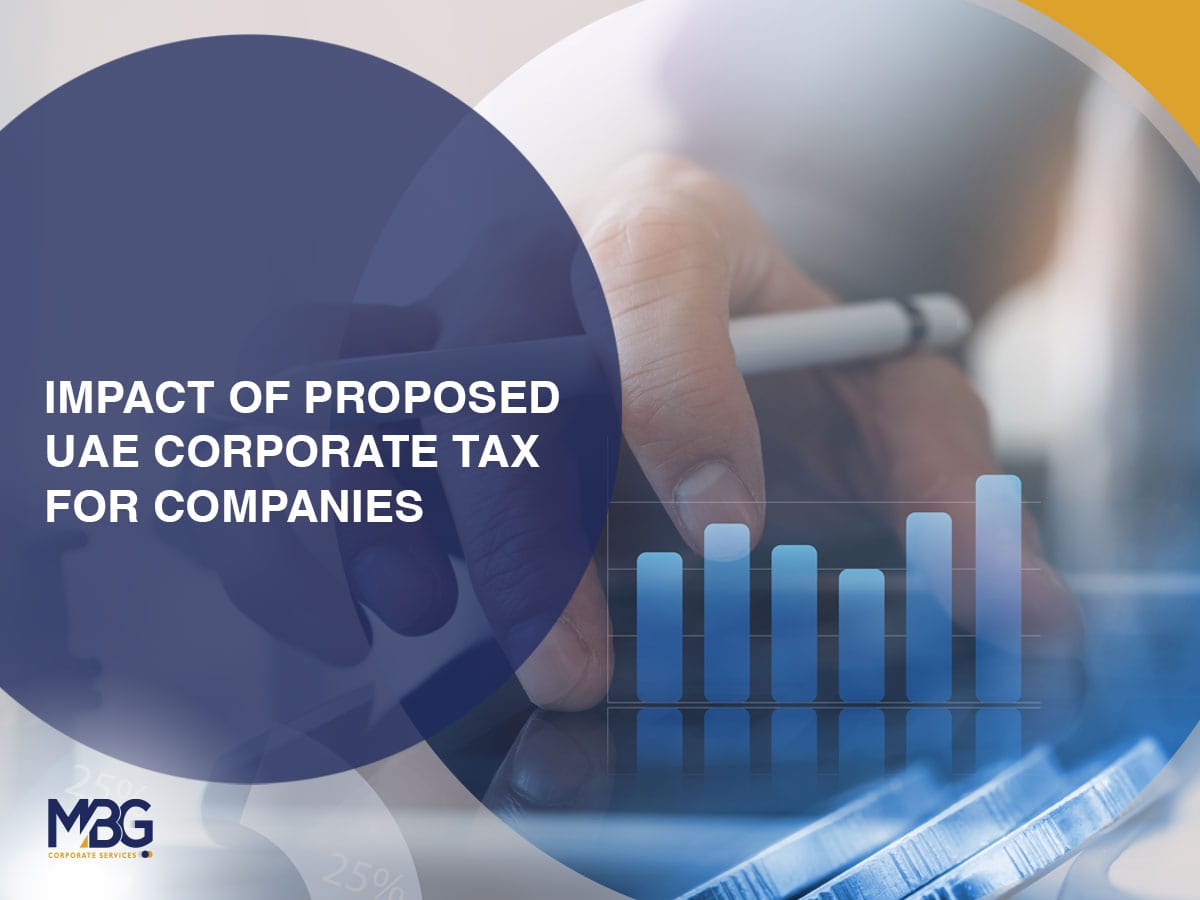Impact of Proposed UAE Corporate Tax for Companies
August 18, 2022

The UAE currently levies a corporate tax for companies only on businesses in the oil sector and on branches of foreign banks. However, this is about to change from Financial Year beginning on or after 1 June 2023 with the introduction of corporate tax for companies in the UAE.
- Applicability of Corporate Tax for Companies
The following companies are covered in the UAE corporate tax regime:
- Domestic companies in the UAE Mainland;
- Free Zone persons;
- Foreign companies that have a Permanent Establishment in the UAE; or earn income from a source in the UAE.
- Classification of Residential Status
- Residents
- Domestic companies; and
- Foreign companies being effectively managed and controlled in the UAE
- Non Residents
An entity that is not a Resident will be considered a Non-Resident and only UAE-sourced income, subject to certain exemptions, and income attributable to a permanent establishment will be taxable in the UAE in case of non-residents.
- Residents
- Progressive UAE Corporate Tax Rate
| Particulars | Rate of tax |
| Annual Taxable income up to AED 375,000/- | 0% |
| Annual Taxable income in excess of AED 375,000/- | 9% |
A different UAE corporate tax rate will apply to multinational corporations with consolidated global revenue in excess of EUR 750 million (approx. AED 1.25 billion).
- Allowable and Disallowable Expenses
Generally, all revenue expenditure incurred for the purpose of business should be allowed as a deduction for computing taxable income
However, the regime of Corporate Tax in UAE as outlined in the public consultation document provides a list of the following expenses that will not be allowed as deductions for computing the taxable income:
- 50% of the expenditure incurred to entertain customers, shareholders, suppliers, and other business partners;
- Administrative penalties;
- Recoverable VAT;
- Donations paid to an unapproved organization;
- Unrealized gains and losses;
- Interest in excess of 30% of EBITDA;
- Payments made to Free Zone persons are taxed at 0% on receipt of the income.
Some more expenditures may also get notified as disallowed expenses for computation of the taxable profits in the final legislation of corporate tax in UAE.
-
Areas of Impact of Corporate Tax on Companies and the Way Forward
- Audit requirement
The taxable income shall be computed on the basis of the profits reported in the Audited Financial Statements prepared in accordance with internationally accepted accounting standards. Further, Free Zone persons must have Audited Financial Statements if they want to benefit from 0% corporate tax in UAE. Thus, companies must now mandatorily have their financial statements audited on time. Further, the appropriate bifurcation between personal/non-business and business expenditures, capital and revenue expenditures, adherence to cut-off procedures, valuation, and quantification of inventory and other accounting principles will now be crucial for determining the correct taxable profits for a tax period.
- Review of systems and processes
Businesses will need to assess the readiness of their current processes and systems in relation to the accounting of income and expenditure, inter-company transactions, capital assets, inventory management, etc., and deliberate upon updating / re-configuring these to meet their reporting and compliance requirements under the UAE corporate tax regime.
- Review of existing contracts with customers and suppliers/service providers
The levy of corporate tax in the UAE will impact the profit margins of companies. Companies may accordingly consider an increase in their selling prices to maintain profit margins. Similarly, suppliers and service providers may consider increasing the cost of goods/services to factor in the additional cost on account of tax outflows. Given this, existing contracts with customers and suppliers may need to be revisited to explore the prospects of price adjustments in the future.
- Risk of Place of Effective Management (‘POEM’) of foreign companies in the UAE
- A UAE-headquartered company operating overseas through foreign subsidiaries or intermediate holding company will need to evaluate the POEM risks of their Foreign Companies in the UAE given that, with the introduction of the POEM concept in the UAE corporate tax regime, the place where key management and commercial decisions are taken would now be crucial and may result in tax exposure. There could also be implications for intra-group and cross-border transactions as discussed in the next point.
- Further, since "residence" is to be determined for each year, POEM will also be required to be determined on a year-on-year basis.
- Permanent Establishment risk in the UAE of foreign companies
With the introduction of the concept of Permanent Establishment (PE) in the proposed UAE corporate tax for companies, foreign companies conducting business in the UAE, through any form of presence should, inter-alia, evaluate their existing business models, long-term agreements and contracts, intragroup and cross border transactions, etc. to assess the impact from a PE risk perspective and undertake appropriate group level and/or transaction level restructuring to mitigate the potential PE exposure.
- Compliance Requirement
-
- Register with the Federal Tax Authority and obtain a Tax Registration Number.
- Compute and pay tax liability and file the tax return within 9 months from the end of the relevant tax period.
- Maintain financial and other records that explain the information contained in the tax return.
- Any transaction between related parties and connected persons should be at arm’s length and should be in line with OECD Transfer Pricing guidelines. Companies falling within the ambit of transfer pricing provisions will have to conduct additional compliances which will be prescribed in the final UAE corporate tax legislation.
MBG can assist companies with high-quality reviews of their current business operations to assess their readiness on meeting compliance requirements under the proposed UAE corporate tax regime and review their existing group structures, contracts, activities, transactions, etc., to evaluate implications from a corporate tax and transfer pricing perspective and specifically evaluate if there is any risk on account of Place of Effective Management or Permanent Establishment.
The much-awaited Federal Decree- Law 47 of 2022 on "Taxation of Corporations and Businesses" is issued! Click to know more about Corporate Tax Law
For any Corporate Tax, enquiry contact us at- +971 526406240 or Email us at:- [email protected]
Article contributed by:
Corporate Tax team - UAE
Disclaimer
The information contained in this document is for general information purposes only. We make no representation or warranties of any kind, express or implied, about the completeness, accuracy, reliability, suitability, or availability with respect to the document or the information provided therein. We reserve the copyright of this document and hence, do not allow anyone to sell, re-publish or re-distribute the document or derivatives thereof.
This document is prepared on perusal of the public consultation document issued by the Ministry of Finance, UAE on 28th April 2022 and internationally accepted principles and rules which do not represent the final legislation; hence, it should not be relied upon for making individual or business decisions.








